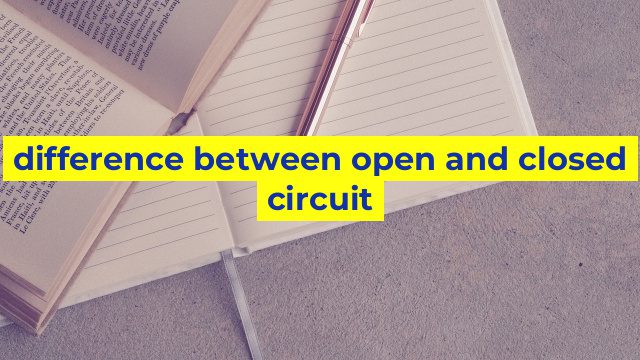The Difference Between Open and Closed Circuits
When it comes to electrical circuits, there are two main types: open and closed. Both have their advantages and disadvantages, and understanding the difference between the two is key to selecting the right circuit for your needs.
Open Circuit
An open circuit is one that is incomplete, meaning there is a gap or break in the circuit that prevents the flow of current. This can occur when a switch is turned off or when a wire is broken. When the circuit is open, the current cannot flow and the device connected to the circuit will not receive power.
Open circuits are often used as safety features, as they prevent electrical devices from operating when they are not supposed to. For example, if a door is left open, a switch could be wired to the door so that when it is open, the switch is open and the circuit is incomplete, turning off the lights or other devices in the room.
Closed Circuit
A closed circuit is a complete circuit, meaning there are no breaks or gaps in the circuit, allowing the current to flow without interruption. When the circuit is closed, the device connected to the circuit will receive power and operate as intended.
Closed circuits are often used in electronic devices, vehicles, and power systems, as they provide a reliable flow of energy to the device. The closed circuit allows for efficient use of power, as none of it is lost due to interruptions in the flow.
Conclusion
Both open and closed circuits have their uses, and understanding their properties is key to selecting the right circuit for your needs. If safety is a concern, an open circuit may be the best choice, while a closed circuit may be more appropriate for electronic devices and other equipment that requires a consistent flow of energy. Ultimately, the choice between open and closed circuits depends on your specific application and needs.
Table difference between open and closed circuit
| Open Circuit | Closed Circuit |
|---|---|
| Electric current does not flow. | Electric current flows. |
| No continuity exists between the two terminals of the circuit. | Continuity exists between the two terminals of the circuit. |
| The switch is open, and the bulb is off. | The switch is closed, and the bulb is on. |
| There is infinite resistance in the circuit. | There is a finite resistance in the circuit. |
| Open circuits occur when a wire is disconnected or a switch is open. | Closed circuits occur when a wire is connected or a switch is closed. |
